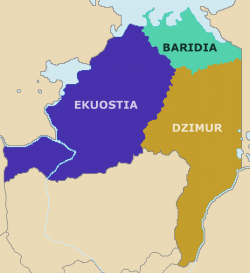Difference between revisions of "Dzimur"
| Line 100: | Line 100: | ||
}} | }} | ||
'''Dzimur''' ([[Dzimraic language|Dzimraic]]: ''Dzimâkilketyam'' [[Dzimraic language#Phonology|[ | '''Dzimur''' ([[Dzimraic language|Dzimraic]]: ''Dzimâkilketyam'' [[Dzimraic language#Phonology|[dzimɚçilkəθjam]]]), [[Ekuostian language|Ekuosticized]] as ''Dyemur'' [[Ekuostian language#Phonology|[djemuɾ]]], is one of the three grand duchies (or states) of [[Barradiwa]], located chiefly in the country's south and southeastern reaches. With a population of 26.5 million people, Dzimur is the second most populous of the three Barradiwan grand duchies. Its capital and most populous city is [[Kostenbad]], which is also Barradiwa's second-largest city. | ||
Dzimur is the home of the [[Dzimrani people|Dzimrani]], an [[Adzamic peoples|Adzamic]] ethnicity and culture who began to grow apart from their parent culture in the twilight years of the [[Adzamasi Empire]], and were further influenced by the cultures of the [[Grand Ekuostian Empire]] and the [[Kudzat people]]. By 1400, the [[Dzimraic language]] (which is still spoken by nearly 30+ million people today) was audibly different from its distant sister language, [[Adzamasi]], with differences including several more [[Ekuostian language|Ekuostian]] loanwords and the adoption of the [[Letsic alphabet]] as their primary script even after disconnecting from the [[Ekuostian Empire]], among various phonological shifts. | Dzimur is the home of the [[Dzimrani people|Dzimrani]], an [[Adzamic peoples|Adzamic]] ethnicity and culture who began to grow apart from their parent culture in the twilight years of the [[Adzamasi Empire]], and were further influenced by the cultures of the [[Grand Ekuostian Empire]] and the [[Kudzat people]]. By 1400, the [[Dzimraic language]] (which is still spoken by nearly 30+ million people today) was audibly different from its distant sister language, [[Adzamasi]], with differences including several more [[Ekuostian language|Ekuostian]] loanwords and the adoption of the [[Letsic alphabet]] as their primary script even after disconnecting from the [[Ekuostian Empire]], among various phonological shifts. | ||
Latest revision as of 12:53, 7 October 2021
Dzimur
Dzimâkilketyam | |
|---|---|
 A map displaying the three subregions of Barradiwa; Dzimur is the southeast region marked in orange. | |
| Capital and largest city | Kostenbad |
| Languages | Dzimraic, Ekuostian |
| Population | |
| • Total | 26,569,418 |
| Demonym(s) | Dzim |
Dzimur (Dzimraic: Dzimâkilketyam [dzimɚçilkəθjam]), Ekuosticized as Dyemur [djemuɾ], is one of the three grand duchies (or states) of Barradiwa, located chiefly in the country's south and southeastern reaches. With a population of 26.5 million people, Dzimur is the second most populous of the three Barradiwan grand duchies. Its capital and most populous city is Kostenbad, which is also Barradiwa's second-largest city.
Dzimur is the home of the Dzimrani, an Adzamic ethnicity and culture who began to grow apart from their parent culture in the twilight years of the Adzamasi Empire, and were further influenced by the cultures of the Grand Ekuostian Empire and the Kudzat people. By 1400, the Dzimraic language (which is still spoken by nearly 30+ million people today) was audibly different from its distant sister language, Adzamasi, with differences including several more Ekuostian loanwords and the adoption of the Letsic alphabet as their primary script even after disconnecting from the Ekuostian Empire, among various phonological shifts.
